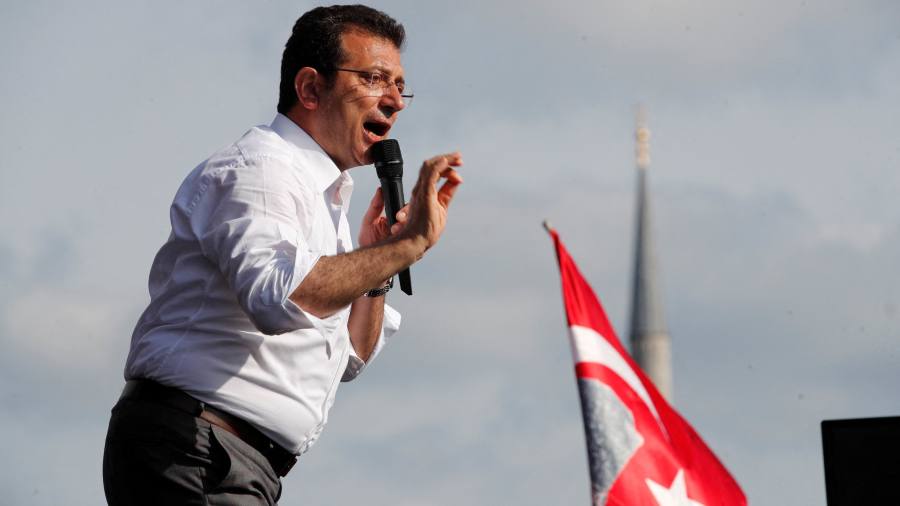
Receive free Ekrem İmamoğlu updates
We’ll send you a myFT Daily Digest email rounding up the latest Ekrem İmamoğlu news every morning.
The latest criminal case launched against Istanbul’s mayor, Ekrem İmamoğlu, is a “baseless” plot to force one of Turkey’s most popular opposition leaders out of politics, his lawyer said.
İmamoğlu faces allegations of corruption as part of a case that opened last month. Proceedings are set to reconvene in November, a few months before crucial local elections in which the opposition will seek to keep control of Istanbul and the capital Ankara.
The charismatic İmamoğlu is seen as one of the most important figures in Turkey’s opposition, and a candidate to one day challenge President Recep Tayyip Erdoğan or his successor. Erdoğan’s determination to regain control of the country’s two biggest cities has made İmamoğlu’s fate a test for whether the strongman leader’s third decade in power will be marked by a more authoritarian turn.
“Be certain of one thing: the manner in which these cases are being conducted in Turkey has no connection whatsoever to the law. The law is being instrumentalised,” Gökhan Günaydın, a legal counsellor for the opposition Republican People’s party (CHP), who is representing İmamoğlu, said in an interview.
İmamoğlu already faces a political ban after a court ruled in December that he had insulted public officials who ordered a rerun of his first election victory as mayor in 2019, which he ultimately won. The US described that verdict, which İmamoğlu is appealing against, as “inconsistent with respect for human rights, fundamental freedoms and the rule of law”.
Erdoğan’s government has long been accused of using the judiciary to muzzle opponents. Analysts say his grip on Turkey’s courts was tightened after thousands of judges were purged following the 2016 coup attempt.
“Turkey’s judiciary has never been independent,” said Emma Sinclair-Webb, head of the Human Rights Watch office in Turkey. But now it was “increasingly tightly controlled by the government and used as a tool by the Erdoğan presidency to silence critics, to remove perceived opponents or those he doesn’t like from the political scene or from civil society.”
İmamoğlu and six others are accused in the second case brought by an Istanbul prosecutor of irregularities in the award of tenders for public contracts. He is accused among other offences of impropriety in a public tender process and causing a loss to the public of about TL250,000, according to the indictment seen by the Financial Times. This was in a previous role as mayor of one of the city’s suburbs.
Günaydın, his lawyer, said the claims were “baseless” and that “there is truly no aspect of this case that can be explained by law”. Turkey’s justice ministry did not respond to a request for comment on the case.
Kerem Gülay, a law professor at Istanbul’s Koç University, said it was too soon to judge the case, but it did appear to be an example of “selective justice”, given there are often irregularities in municipal bidding processes that went uninvestigated.
The close timing of the second case against İmamoğlu to the earlier conviction showed “there’s a pattern here, and it looks very important,” he added.
İmamoğlu’s troubles are not the first time opposition politicians in Turkey have run afoul of prosecutors. Selahattin Demirtaş, who led the leftwing Peoples’ Democratic party, has been in a Turkish prison since 2016 on terrorism charges stemming from his political speeches, even though the European Court of Human Rights has ruled his detention as unlawful. Mansur Yavaş, CHP mayor of Ankara, was acquitted in 2020 of charges he misused promissory notes when he worked as a lawyer.
According to the indictment, the latest case against İmamoğlu was opened after a referral from the interior minister led by Süleyman Soylu, a hardline figure who ran the ministry from 2016 until last month.
“This is an attack,” İmamoğlu told reporters on June 22. “A few more cases will probably come as [inspectors] demand case files dating back 30 years on my building sites” a reference to when İmamoğlu ran his family’s construction firm.
Howard Eissenstat, a Turkey specialist at St Lawrence University in New York state and the Middle East Institute in Washington, said: “It’s not a legal process — it’s a political decision on the part of the government. The court cases are not being determined by the law but by Erdoğan’s own political calculations.
“The real question is whether the risks [to Erdoğan] of banning İmamoğlu are greater than the possible rewards.”